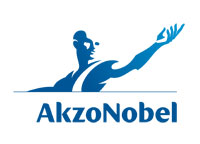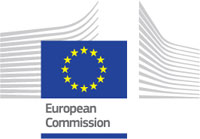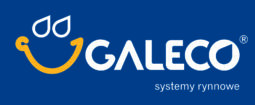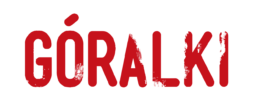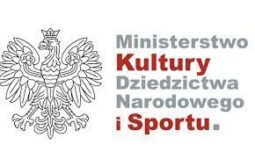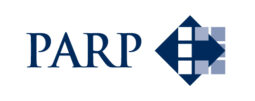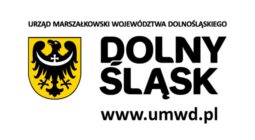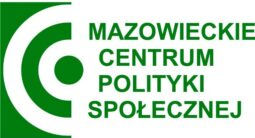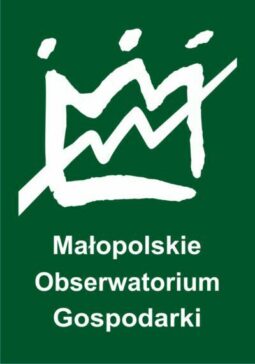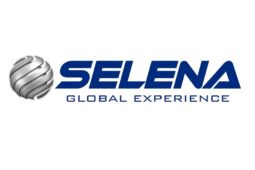Research on the effectiveness of promotional activities
Table
of contents
- What is the effectiveness of promotional activities?
- Why is research on the effectiveness of promotional activities so important?
- What is research on the effectiveness of promotional activities?
- What makes an effective advertising campaign?
- When to research the effectiveness of promotional activities?
- Who should conduct research on the effectiveness of promotional activities?
- Our clients
- Which techniques do we apply in research on the effectiveness of promotional activities?
- Why choose our offer?
- Research on the effectiveness of promotional activities – Price list
- FAQ
The main objective of promotional activities is to shape or change the attitudes of the target audience towards a specific product (convincing them that this brand is superior to competitors) and thereby influencing their behavior (encouraging them to purchase this brand, not others). Promotional activities will be effective if they yield a surplus of achieved results over the costs incurred to implement these actions.

A trustworthy sender of an advertising message is someone who inspires trust and has the relevant knowledge, skills, and experience. The person is considered trustworthy because he or she is widely respected and valued or is an authority in a particular field. An attractive sender is someone who evokes positive feelings and emotions in a person who receives the message. Attractiveness can also result from the audience’s identification with the sender (e.g., a “typical” homemaker) or it may evoke admiration and, therefore, a desire to resemble the sender (e.g. a beautiful model).
Why is research on the effectiveness of promotional activities so important?
In today’s highly competitive market and saturation with advertising messages, most advertisers do not rely solely on intuition when creating ads, ignoring the insights provided by marketing research that offer knowledge about consumers and future ad recipients. Research is expected to provide specific market information: the availability of competing products, user perceptions, advertising techniques used in the category (segment), brand usage patterns. Decisions regarding product and communication strategies are made based on this data and serve as a starting point for the advertising agency in creating campaigns.
Ignoring this information can lead to creation of advertising messages that do not correspond to the characteristics of the target audience (e.g., an advertisement aimed at youth but appealing to values common among adults) or emphasizing product features that are irrelevant to users. As a result, an inappropriate campaign may be developed. Early contact with potential ad recipients through research allows those responsible for producing ads to understand the target audience better.
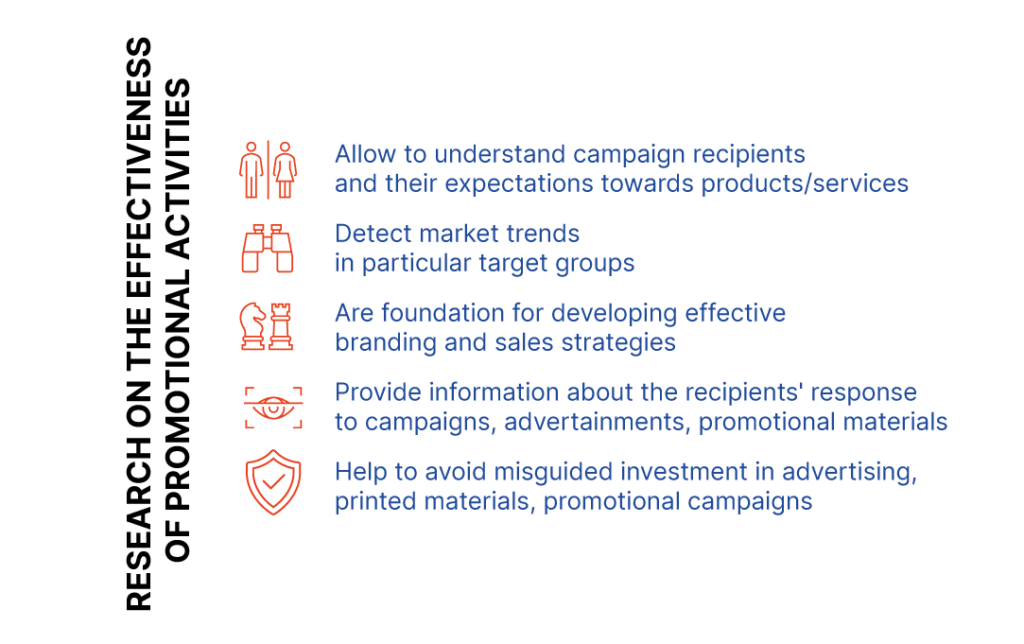
What is research on the effectiveness of promotional activities?
Advertising research is an important and complex group of marketing research that focuses on the emotions and attitudes of consumers, as well as the complex relationship between attitude and behavior (the connection between perception of advertising and purchasing reactions to the advertised products).
Advertising producers (advertising agencies) and companies producing advertised products are constantly trying to ensure that their efforts and advertising investments bring the desired effect, which means that the advertisement they produce is effective. However, research cannot guarantee this outcome; it can only minimize the risk of making mistakes during the advertising creation process and thereby increase the likelihood of effectiveness.
The results of marketing research can also help in evaluating the effectiveness of a conducted campaign. Advertising research is a very broad and comprehensive concept, which is why various methods and research techniques are used.

The process of researching the effectiveness of promotional activities includes:
- advertising messages research,
- advertising content research,
- researching the visibility of marketing messages,
- analyzing advertising material in terms of its construction/correctness,
- analyzing the content of marketing/advertising messages,
- indicator of the emotional reception of the advertisement/campaign.
Assessing campaign effectiveness involves not only analyzing numbers and indicators (such as TOM – top of mind awareness, spontaneous and aided brand awareness, advertising reach, OTS – opportunity to see, OTH – opportunity to hear, advertising frequency, etc.), but also the emotions of the audience. Research using EEG (electroencephalography), EMG (electromyography), and facial tracking allows for a deeper understanding of consumers and their reactions, as well as designing the message in an appropriate manner.
What makes an effective advertising campaign?

To analyse the change in attitude towards the advertised product, that is, the persuasive effect of the advertisement, we compare the responses to various questions posed to consumers before and after the advertising campaign. These questions concern the advertised brand as well as competing brands.
If, after the campaign for a particular brand, consumers associate the attributes presented in the advertisement with this brand more often than before the campaign and more frequently than with its competitors, then we can speak of a change in attitude and the persuasive impact of the advertisement.
The most effective way to measure the effectiveness of advertising is, of course, by observing changes in behavior, meaning the actual purchase of the product.
A well-planned campaign ensures reaching the intended target audience. Marketing research allows you to verify its accuracy and reach.
When to research the effectiveness of promotional activities?
Researching the effectiveness of promotional activities should be a continuous and systematic process, to better understand the needs, desires, and expectations of consumers. Understanding the target audience is the foundation of effective promotional efforts.
Many companies are convinced that they know exactly what their customers need, what services or products they require. Often, this is a mistaken belief stemming from a rare or one-time analysis of the effectiveness of promotional activities. This means that there is a need to systematically monitor the changing factors that actually influence the behavior of the customers to whom we address our offer.
To keep up with the constant changes in the global world, we must constantly update our knowledge about the effectiveness of promotional activities.

Who should conduct research on the effectiveness of promotional activities?

For every business, researching the effectiveness of promotional activities should be the foundation to answer the question for which consumer group we are creating a particular product or service.
This type of research can be used by anyone who wants to establish a presence on the market and achieve success, who wants to increase product sales, introduce a new product that will be positively received by consumers, or gain a competitive advantage.
Most importantly, it is for those who do not want to waste money on ineffective promotional efforts.
So far, we have had the opportunity to cooperate with various companies, who were interested in introducing changes in their current business operations. The research conducted aimed to help in the further implementation of plans and acquiring new customers.
Which techniques do we apply in research on the effectiveness of promotional activities?
We use the following techniques in our research on the effectiveness of promotional activities:
CATI
Telephone interview
CAWI
Online survey
PAPI
Pen and paper survey
Face to face FGI
Group interviews
FGI on-line
Group interviews
Ethnography
Observation and description
IDI
Individual face to face in-depth interviews
ITI
Individual online in-depth interviews
CAPI
Computer-Assisted Personal Interviews
Dyads, tryads
Small group interviews
User tests
Product tests, consumer’s assessment
DR
Desk research, secondary data analysis
MOBI
Face-to-face survey on mobile devices
Eye tracking
Biometric research – tracking the eye movement
Face tracking
Biometric research – facial expression analysis
Mystery e-mailing
Mystery shopper – testing customer service via email
Mystery calling
Mystery shopper – testing customer service via phone
Mystery shopping
Mystery shopper – testing face-to-face customer service
Project design methods
Design thinking, iterative design
Motion tracking
Motion capture - XSENS, Vicon, Kinect
Auditorium questionnaire
A questionnaire filled in by a specific group being in the same room
EMG
Biometric research – analysis of micro expression of facial muscles
EEG
Biometric research – brain activity analysis
GSR
Biometric research – the galvanic skin response
Currently, the most effective techniques for researching the effectiveness of promotional activities involve combining neuromarketing with traditional methods such as surveys or in-depth interviews. Neuromarketing is a fusion of medical and psychological knowledge, technology, and marketing. The effectiveness of advertising messages can be documented through neuromarketing research, which enables a detailed analysis of the impact of key factors that make advertising effective.
By analyzing a person’s reactions to sensory stimuli, it is possible to verify the declarative data provided by the respondent and gain knowledge about the emotions of the customer in response to the advertising message.
The electroencephalogram (EEG) is used to measure brainwave activity, providing insights into how the brain responds to stimuli. Special lightweight caps with sensors are placed on the subject’s head, forming a high-density grid that records signals of very low voltage. EEG research can be combined with ocular measurements (eye tracking), which determine where the person is looking when experiencing a stimulus, as well as facial expression analysis (face tracking), which provides data on the customer’s emotions at a given moment. We can obtain answers to various questions, such as:
- How will consumers respond to a new product or advertising message?
- How will they react to specific features of a new product?
- Will the design of packaging, leaflet, or advertisements capture high attention from consumers?
- Which version of packaging or advertisement evokes the best reactions in terms of purchasing decisions?
We can gather data on the level of attention and emotional engagement from a selected part of the advertising message and assess the risk of consumer disengagement, indicating which parts of the advertisement may require further improvement.
We can determine whether, after repeating an advertising message, its effectiveness decreases, allowing us to optimize decisions regarding the purchase of advertising airtime.
We can capture the most neurologically effective moments in the advertisement and shorten its duration to the necessary minimum, thus saving significant costs in terms of advertising placement.
Based on advertising reception research, we can determine the extent to which a product has been ingrained in the consumer’s mind, thereby significantly increasing their readiness to make purchasing decisions.
Through eye movement analysis, we can evaluate the effectiveness of specific characters, narrators, graphics, and diagnose their impact. We can identify the moments that evoke the highest purchase readiness, leading to a significant increase in sales.
Why chooseour offer?
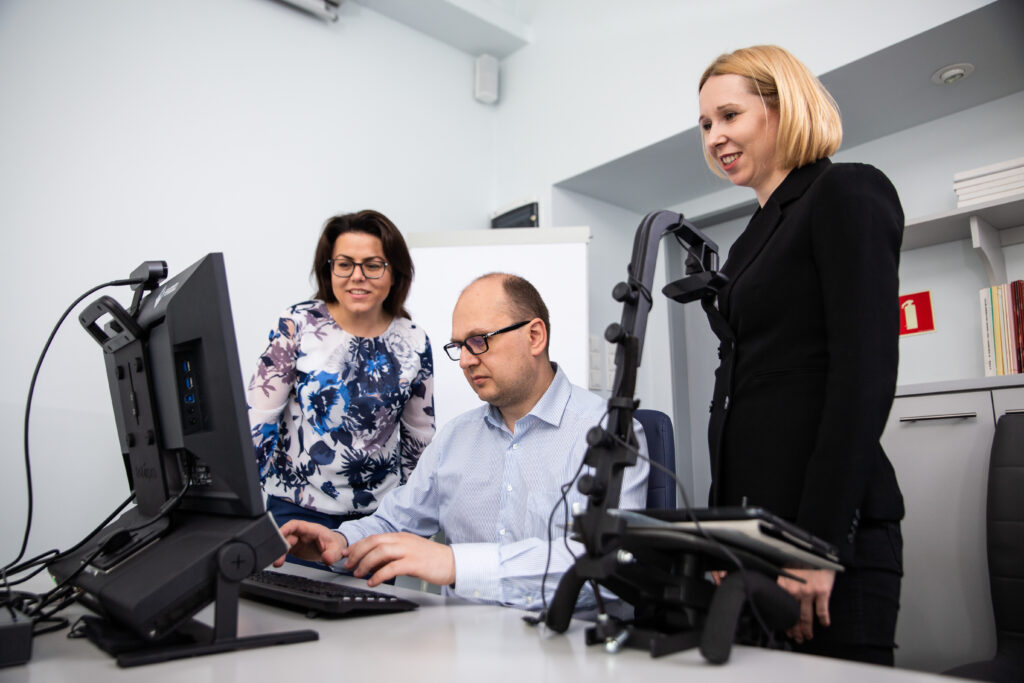
Since 1996, we have been carrying out marketing research. Owing to the highest quality standards, professionalism and acquired experience, we take great pride in high indicator of returning clients.
We regularly acquire new satisfied customers who benefit from the research conducted by us.
We are specialists in this field, which translates to our clients achieving their expected goals.
We will be happy to answer your questions and suggest research methods most suitable for each individual case. We kindly invite you to get familiar with our full offer.
Research on the effectiveness of promotional activities – Price list
The research on the effectiveness of promotional activities, which we carry out, is customised and tailored to each client’s needs. Therefore, we strongly recommend contacting us, in order to obtain a detailed price list.
FAQ
Due to the multitude of investigated factors, the research schedule is discussed individually with each client. However, the average project duration is 5-6 weeks. This can be shortened or extended, depending on the methodology and planned scope of analysis.
Research on the effectiveness of promotional activities provides answers to questions, such as whether the advertisements we create will achieve the intended outcome and whether the implemented promotional efforts were effective. Through analyses of the effectiveness of promotional activities, we can create more effective advertising campaigns that differentiate us from the competition, gain trust among consumers, and bring about favorable changes in their purchasing decisions.
For every business, research on the effectiveness of promotional activities should be the foundation to answer the question of which consumer group we are creating a particular product or service for. Anyone who wants to establish a presence and succeed in the market, increase product sales, introduce a new product that will be positively received by consumers, or gain a competitive advantage can benefit from this research. Most importantly, it is for those who do not want to waste money on ineffective promotional efforts.
Marketing research is a set of tools and activities aimed at gathering as much information as possible about the potential target customer. The goal is to obtain the most accurate picture. A well-prepared marketing research report helps finalize the format and timing of your product’s advertising campaign. Qualitative marketing research is the key to successfully introducing a brand to the market. Refusal to conduct them as part of preparations for launching a new brand in the market can lead to market failure.
The objectives of campaign effectiveness research are to obtain knowledge about the impact of campaigns on the achievement of business strategies. This is done through continuous monitoring of progress, analysis of current business conditions, and review of key performance indicators. By doing so, it becomes possible to evaluate the results of our actions and develop plans to achieve goals. Research also facilitates overall organization and efficient utilization of the campaign budget. Precisely defining objectives is the key to achieving satisfactory results.
We support all the industries






